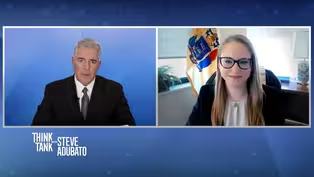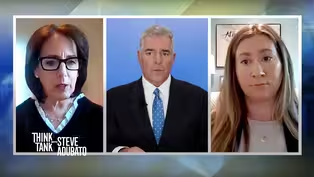
The Pressing Need For Viable Immigration Reform
Clip: 6/1/2024 | 9m 7sVideo has Closed Captions
The Pressing Need For Viable Immigration Reform
Jason C. Hernandez, Esq., Director of the Rutgers Immigrant Community Assistance Project and Adjunct Professor at Rutgers School of Law, joins Steve Adubato to discuss common misconceptions about immigration and the need for viable reform.
Problems playing video? | Closed Captioning Feedback
Problems playing video? | Closed Captioning Feedback
Think Tank with Steve Adubato is a local public television program presented by NJ PBS

The Pressing Need For Viable Immigration Reform
Clip: 6/1/2024 | 9m 7sVideo has Closed Captions
Jason C. Hernandez, Esq., Director of the Rutgers Immigrant Community Assistance Project and Adjunct Professor at Rutgers School of Law, joins Steve Adubato to discuss common misconceptions about immigration and the need for viable reform.
Problems playing video? | Closed Captioning Feedback
How to Watch Think Tank with Steve Adubato
Think Tank with Steve Adubato is available to stream on pbs.org and the free PBS App, available on iPhone, Apple TV, Android TV, Android smartphones, Amazon Fire TV, Amazon Fire Tablet, Roku, Samsung Smart TV, and Vizio.
Providing Support for PBS.org
Learn Moreabout PBS online sponsorship- We're now joined by Jason Hernandez, who is managing attorney and adjunct professor at Rutgers Law School.
Jason, good to see you.
- Good to be with you today.
- Put in perspective the immigration initiative you're involved in at the university.
What is it called exactly?
- Sure, so I run the Rutgers Immigrant Community Assistance Project, and it provides campus-based immigration legal services to students enrolled throughout Rutgers University.
This basically includes providing students with free legal consultations about their immigration matters, or immigration situation, and in some cases, representing them in immigration cases before USCIS, or Immigration Court, if they're in removal proceedings.
- Let me ask you this, Jason, as we do this program at the end of April, 2024, the migrant crisis, first of all, is it a crisis from your perspective?
People can decide for themselves.
Second of all, how has it influenced public sentiment and discourse?
Not to mention the politics of immigration.
Loaded question, I know, but that's what's been playing on my mind in preparation for you coming on.
- So I guess it depends on what you mean when you say "the migrant crisis".
If we're talking- - Do you think there's a migrant crisis of communities being overrun by people who are coming into the country, the border issue, if you will, again, and taking away services and creating problems in urban communities throughout this country.
Do you think that's a crisis?
- I do not think that's a crisis.
I think that is, I guess, you know, par for the course, for probably the past 30 years that there have been migrants in the United States.
I don't know that they have been taking resources away from US citizens.
In large part, the Federal Government prefaces eligibility for immigration, for federal benefits or resources on having lawful status in the United States.
Certainly there has been an acute situation that was reported in New York of late, or in certain urban centers.
And yes, you know, December 2023 reports of, you know, the largest population of migrants at the border.
But in 2000 there were 220,000 migrants at the border, only 30,000 more than in December.
And during the Bush administration, the largest number of undocumented individuals ever were living in the United States, close to 12 million.
Whereas today, we're around 11 million.
- What's the impact in New Jersey?
- So New Jersey does have a very large immigrant population, and immigrants do definitely contribute to the very rich economy of New Jersey.
New Jersey definitely has a very, has large urban centers, and also large agricultural areas where many employers rely on immigrants to do work, to provide, you know, food to the people of New Jersey, to provide healthcare services to the people of New Jersey, and to just generally enrich the State of New Jersey.
- Jason, along those lines, how do you respond to the quote, "anti-immigrant, anti-migrant sentiment" in which is not, you don't need me to tell you that there is that sentiment, regardless of what the numbers are, and the facts are, as you described, there's a sentiment, there's an emotional feeling on the part of, I don't know how many, but not an insignificant number of folks.
What do you say to those folks?
- I say, like, I hear your, like what you are feeling.
I think that a lot of this discussion around immigration is heavily politicized.
- Why?
- And encouraged, because, well, because it has become the primary issue within the presidential election.
We know that immigration mobilizes voters to turn out.
And also immigration is just a political beast, because congress sets policies around immigration.
And so by nature, politics feed into the laws that are immigration laws.
- And the last substantive immigration policy on the federal level was back in 1996.
- That's right, so in 1996 was the last year reform to immigration law.
And in that reform, there were actually a lot of expanded grounds for inadmissibility, bars to admissibility, like the three and 10 year bars.
And this has contributed to- - What does that mean?
What does that mean?
Three and 10 year bars?
- Ah, so what that means is, for folks who are in the United States for a period of more than six months, but less than a year, if they depart the US even to consulate process for a green card, they're barred from reentry for three years.
If they're here for more than a year, and then depart, they're barred for 10 years.
And so for many people who have a qualifying petition, they can't actually benefit from it, because of this 1996 law, which creates great obstructions to large numbers of individuals - So the discussion "build the wall", Trump, everybody knows what he has said, what's real or not, it's hard to determine.
"Build the wall".
"Shut our borders down."
Your problem with that thinking, which isn't even a policy, it's just thinking and emotional response.
"Close the borders."
You say what?
- I say, it won't work, right.
It's a bandaid that we don't even know if it will address the symptom to be quite honest, the borders are not open just with people flowing back and forth.
There are, as we know, like thousands of customs and border protection officials every day that are monitoring lawful entry and exits from the United States, as well as monitoring entries at non ports of entry.
I mean, if we really want to address some of these problems, you know, immigration reform in certain areas is really critical.
We see, for example, in Mexico- - Well, go name a couple of things, sorry to interrupt, Jason.
A couple things that need to be done for immigration reform, please.
- Well, there are so many, but I mean just, - Well just name, just a couple so that- - Paths to citizen... Like work authorization, or earned paths to citizenship in some form, right.
So there are a number of different individuals in the United States awaiting status.
They have pending petitions.
Work authorization will be one way to, you know, enable people to work lawfully in the United States, receive certain protections, you know, from employment abuses.
And also to to just earn money to support themselves, but also having earned paths to citizenship or expanded possibilities for petitioning where there are really long backlogs.
So we've seen that in Mexico, or in Central America, there's been a decrease in border crossings related to expanded opportunities for Mexican nationals to migrate to the United States, for example.
So by having more ordered paths to migration, but also recognizing that we need to have humane practices at the border.
I mean, the reason why folks are coming to the United States in the first place is because the United States law says that we will permit people to seek asylum if they are inside the territorial United States, regardless of their status.
- You know, to your point, you said there are a lot of things that need to be done.
The reason I ask for a couple is because nothing has been done.
And to have some degree, to make some degree of progress, there was legislation in Washington, research it, find out what happened, find out how it never passed, why it never passed, who was against it, and why they were against it.
And you can decide for yourself who really wants immigration reform and improvement, and who wants to make the issue political.
I'm off my soapbox, Jason Hernandez, is in fact a managing attorney and adjunct professor at Rutgers Law School, one of the nation's top experts when it comes to immigration policy and law.
Jason, thank you so much for joining us, we appreciate it.
- My pleasure, thank you.
- You got it.
Stay with us, we'll be right back.
- [Narrator] Think Tank with Steve Adubato is a production of the Caucus Educational Corporation.
Celebrating 30 years in public broadcasting.
Funding has been provided by Horizon Blue Cross Blue Shield of New Jersey.
The Healthcare Foundation of New Jersey.
Citizens Philanthropic Foundation.
The New Jersey Education Association.
Atlantic Health System.
New Jersey’s Clean Energy program.
PSEG Foundation.
NJM Insurance Group.
And by IBEW Local 102.
Promotional support provided by The New Jersey Business & Industry Association.
And by New Jersey Globe.
- Hi, I’m Doctor Jones, and I’m encouraging all women 40 and over to schedule their mammograms.
Mammograms detect breast cancer early when it’s easiest to treat.
As a woman of color, I know the instance of breast cancer Including the most aggressive type, triple negative, is higher for us, and we’re often diagnosed later when treatment is more difficult.
So it’s important to start annual screenings at age 40.
Please don’t skip your mammogram, schedule yours today and ask all the women in your life to schedule theirs.
Investing Federal Funds In Opioid Prevention And Recovery
Video has Closed Captions
Clip: 6/1/2024 | 9m 12s | Investing Federal Funds In Opioid Prevention And Recovery (9m 12s)
Trauma-Informed Practices and Youth Mental Health
Video has Closed Captions
Clip: 6/1/2024 | 9m 28s | Trauma-Informed Practices and Youth Mental Health (9m 28s)
Providing Support for PBS.org
Learn Moreabout PBS online sponsorship
- News and Public Affairs

Top journalists deliver compelling original analysis of the hour's headlines.

- News and Public Affairs

FRONTLINE is investigative journalism that questions, explains and changes our world.












Support for PBS provided by:
Think Tank with Steve Adubato is a local public television program presented by NJ PBS

